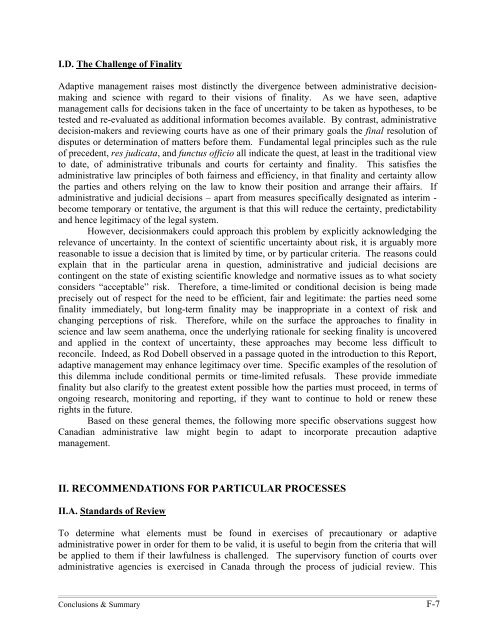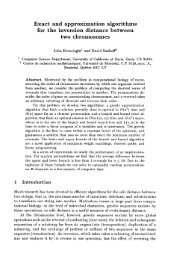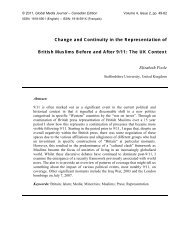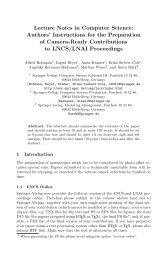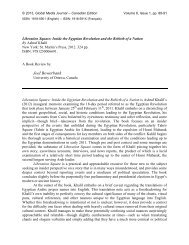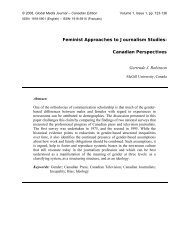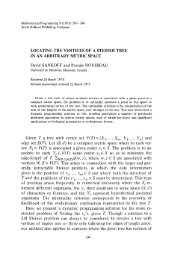PRACTICING PRECAUTION and ADAPTIVE MANAGEMENT ...
PRACTICING PRECAUTION and ADAPTIVE MANAGEMENT ...
PRACTICING PRECAUTION and ADAPTIVE MANAGEMENT ...
- No tags were found...
You also want an ePaper? Increase the reach of your titles
YUMPU automatically turns print PDFs into web optimized ePapers that Google loves.
I.D. The Challenge of FinalityAdaptive management raises most distinctly the divergence between administrative decisionmaking<strong>and</strong> science with regard to their visions of finality. As we have seen, adaptivemanagement calls for decisions taken in the face of uncertainty to be taken as hypotheses, to betested <strong>and</strong> re-evaluated as additional information becomes available. By contrast, administrativedecision-makers <strong>and</strong> reviewing courts have as one of their primary goals the final resolution ofdisputes or determination of matters before them. Fundamental legal principles such as the ruleof precedent, res judicata, <strong>and</strong> functus officio all indicate the quest, at least in the traditional viewto date, of administrative tribunals <strong>and</strong> courts for certainty <strong>and</strong> finality. This satisfies theadministrative law principles of both fairness <strong>and</strong> efficiency, in that finality <strong>and</strong> certainty allowthe parties <strong>and</strong> others relying on the law to know their position <strong>and</strong> arrange their affairs. Ifadministrative <strong>and</strong> judicial decisions – apart from measures specifically designated as interim -become temporary or tentative, the argument is that this will reduce the certainty, predictability<strong>and</strong> hence legitimacy of the legal system.However, decisionmakers could approach this problem by explicitly acknowledging therelevance of uncertainty. In the context of scientific uncertainty about risk, it is arguably morereasonable to issue a decision that is limited by time, or by particular criteria. The reasons couldexplain that in the particular arena in question, administrative <strong>and</strong> judicial decisions arecontingent on the state of existing scientific knowledge <strong>and</strong> normative issues as to what societyconsiders “acceptable” risk. Therefore, a time-limited or conditional decision is being madeprecisely out of respect for the need to be efficient, fair <strong>and</strong> legitimate: the parties need somefinality immediately, but long-term finality may be inappropriate in a context of risk <strong>and</strong>changing perceptions of risk. Therefore, while on the surface the approaches to finality inscience <strong>and</strong> law seem anathema, once the underlying rationale for seeking finality is uncovered<strong>and</strong> applied in the context of uncertainty, these approaches may become less difficult toreconcile. Indeed, as Rod Dobell observed in a passage quoted in the introduction to this Report,adaptive management may enhance legitimacy over time. Specific examples of the resolution ofthis dilemma include conditional permits or time-limited refusals. These provide immediatefinality but also clarify to the greatest extent possible how the parties must proceed, in terms ofongoing research, monitoring <strong>and</strong> reporting, if they want to continue to hold or renew theserights in the future.Based on these general themes, the following more specific observations suggest howCanadian administrative law might begin to adapt to incorporate precaution adaptivemanagement.II. RECOMMENDATIONS FOR PARTICULAR PROCESSESII.A. St<strong>and</strong>ards of ReviewTo determine what elements must be found in exercises of precautionary or adaptiveadministrative power in order for them to be valid, it is useful to begin from the criteria that willbe applied to them if their lawfulness is challenged. The supervisory function of courts overadministrative agencies is exercised in Canada through the process of judicial review. ThisConclusions & Summary F-7


